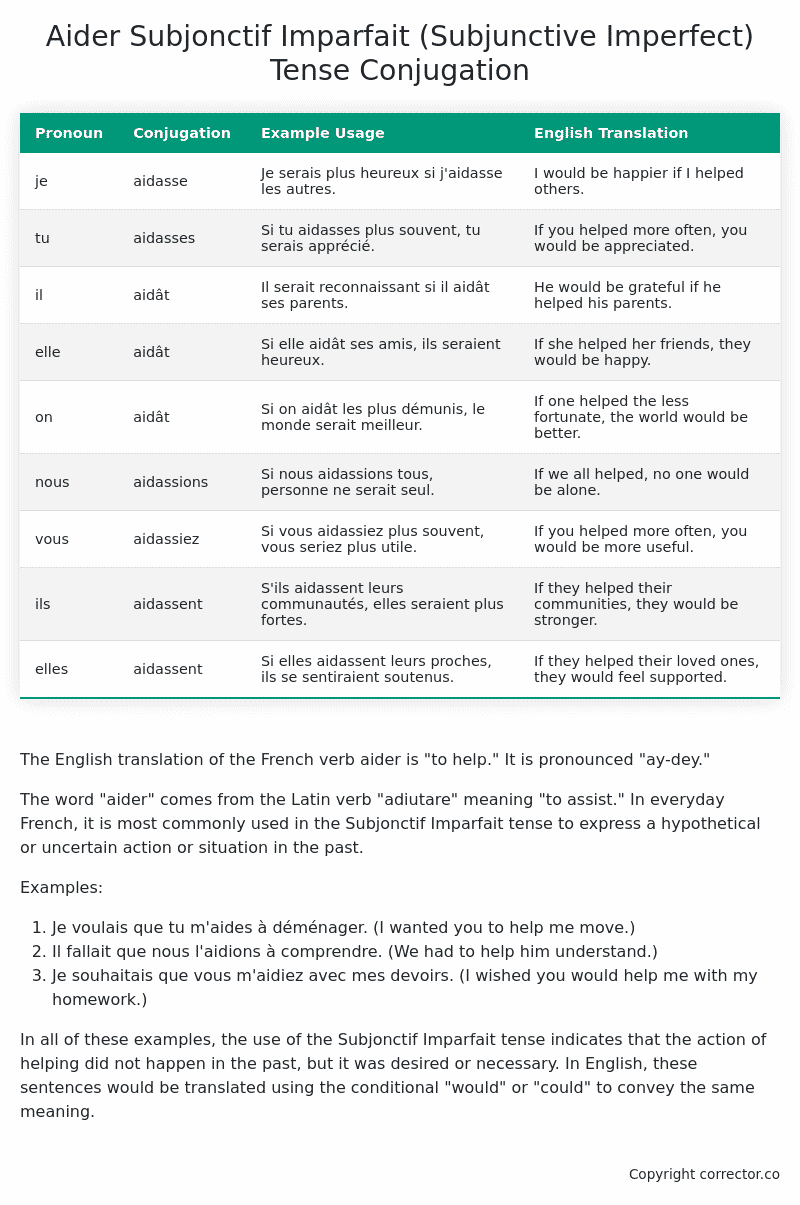Subjonctif Imparfait (Subjunctive Imperfect) Tense Conjugation of the French Verb aider
Introduction to the verb aider
The English translation of the French verb aider is “to help.” It is pronounced “ay-dey.”
The word “aider” comes from the Latin verb “adiutare” meaning “to assist.” In everyday French, it is most commonly used in the Subjonctif Imparfait tense to express a hypothetical or uncertain action or situation in the past.
Examples:
- Je voulais que tu m’aides à déménager. (I wanted you to help me move.)
- Il fallait que nous l’aidions à comprendre. (We had to help him understand.)
- Je souhaitais que vous m’aidiez avec mes devoirs. (I wished you would help me with my homework.)
In all of these examples, the use of the Subjonctif Imparfait tense indicates that the action of helping did not happen in the past, but it was desired or necessary. In English, these sentences would be translated using the conditional “would” or “could” to convey the same meaning.
Table of the Subjonctif Imparfait (Subjunctive Imperfect) Tense Conjugation of aider
| Pronoun | Conjugation | Example Usage | English Translation |
|---|---|---|---|
| je | aidasse | Je serais plus heureux si j’aidasse les autres. | I would be happier if I helped others. |
| tu | aidasses | Si tu aidasses plus souvent, tu serais apprécié. | If you helped more often, you would be appreciated. |
| il | aidât | Il serait reconnaissant si il aidât ses parents. | He would be grateful if he helped his parents. |
| elle | aidât | Si elle aidât ses amis, ils seraient heureux. | If she helped her friends, they would be happy. |
| on | aidât | Si on aidât les plus démunis, le monde serait meilleur. | If one helped the less fortunate, the world would be better. |
| nous | aidassions | Si nous aidassions tous, personne ne serait seul. | If we all helped, no one would be alone. |
| vous | aidassiez | Si vous aidassiez plus souvent, vous seriez plus utile. | If you helped more often, you would be more useful. |
| ils | aidassent | S’ils aidassent leurs communautés, elles seraient plus fortes. | If they helped their communities, they would be stronger. |
| elles | aidassent | Si elles aidassent leurs proches, ils se sentiraient soutenus. | If they helped their loved ones, they would feel supported. |
Other Conjugations for Aider.
Le Present (Present Tense) Conjugation of the French Verb aider
Imparfait (Imperfect) Tense Conjugation of the French Verb aider
Passé Simple (Simple Past) Tense Conjugation of the French Verb aider
Passé Composé (Present Perfect) Tense Conjugation of the French Verb aider
Futur Simple (Simple Future) Tense Conjugation of the French Verb aider
Futur Proche (Near Future) Tense Conjugation of the French Verb aider
Plus-que-parfait (Pluperfect) Tense Conjugation of the French Verb aider
Passé Antérieur (Past Anterior) Tense Conjugation of the French Verb aider
Futur Antérieur (Future Anterior) Tense Conjugation of the French Verb aider
Subjonctif Présent (Subjunctive Present) Tense Conjugation of the French Verb aider
Subjonctif Passé (Subjunctive Past) Tense Conjugation of the French Verb aider
Subjonctif Imparfait (Subjunctive Imperfect) Tense Conjugation of the French Verb aider (this article)
Subjonctif Plus-que-parfait (Subjunctive Pluperfect) Tense Conjugation of the French Verb aider
Conditionnel Présent (Conditional Present) Tense Conjugation of the French Verb aider
Conditionnel Passé (Conditional Past) Tense Conjugation of the French Verb aider
L’impératif Présent (Imperative Present) Tense Conjugation of the French Verb aider
L’infinitif Présent (Infinitive Present) Tense Conjugation of the French Verb aider
Struggling with French verbs or the language in general? Why not use our free French Grammar Checker – no registration required!
Get a FREE Download Study Sheet of this Conjugation 🔥
Simply right click the image below, click “save image” and get your free reference for the aider Subjonctif Imparfait tense conjugation!

Aider – About the French Subjonctif Imparfait (Subjunctive Imperfect) Tense
Formation
Common Everyday Usage Patterns
Interactions with Other Tenses
Subjonctif Présent
Indicatif Passé Composé
Conditional
Conditional Perfect
Summary
I hope you enjoyed this article on the verb aider. Still in a learning mood? Check out another TOTALLY random French verb conjugation!


